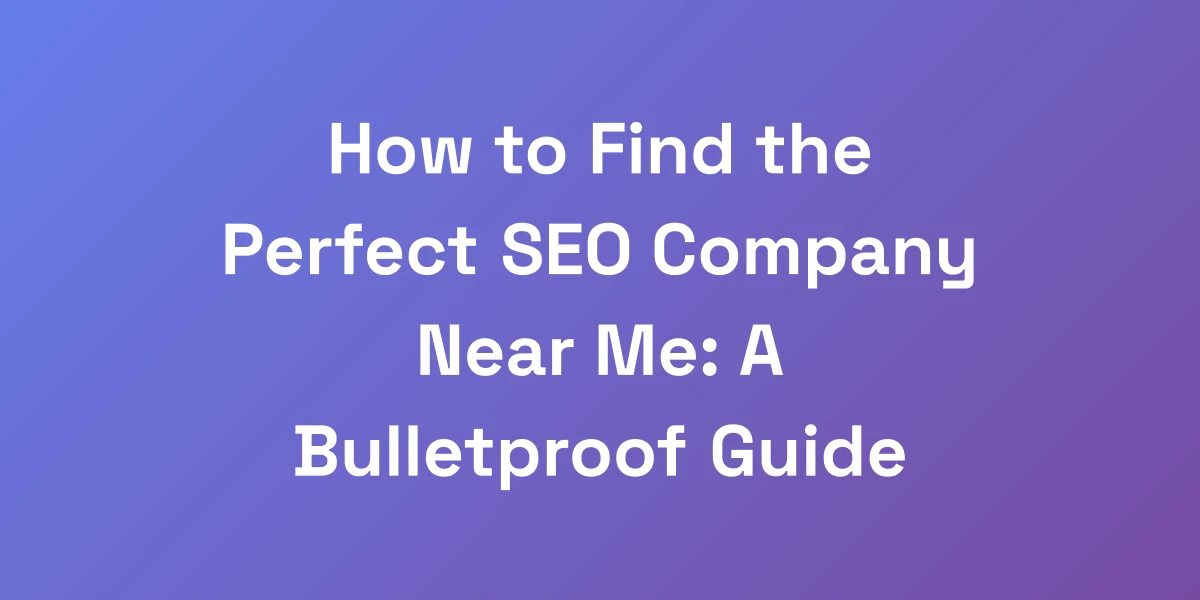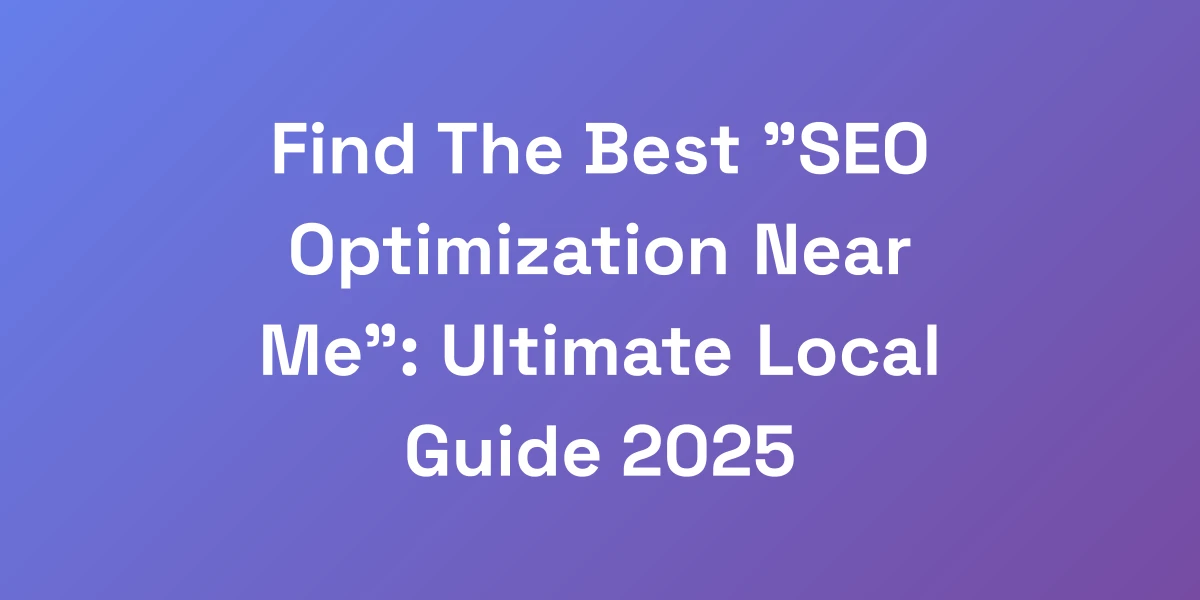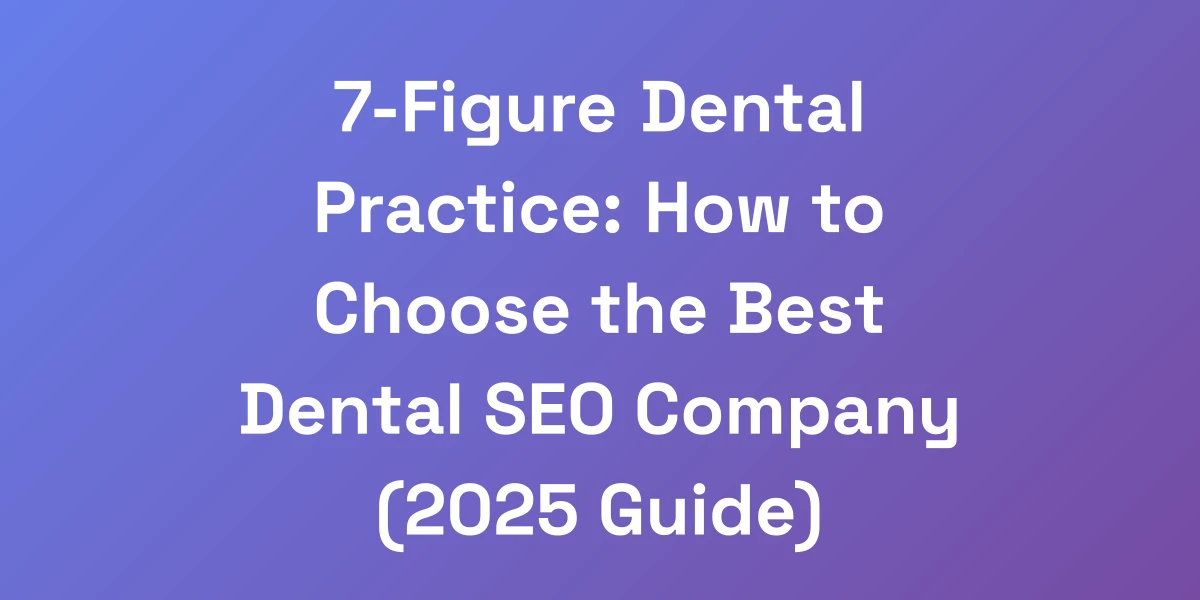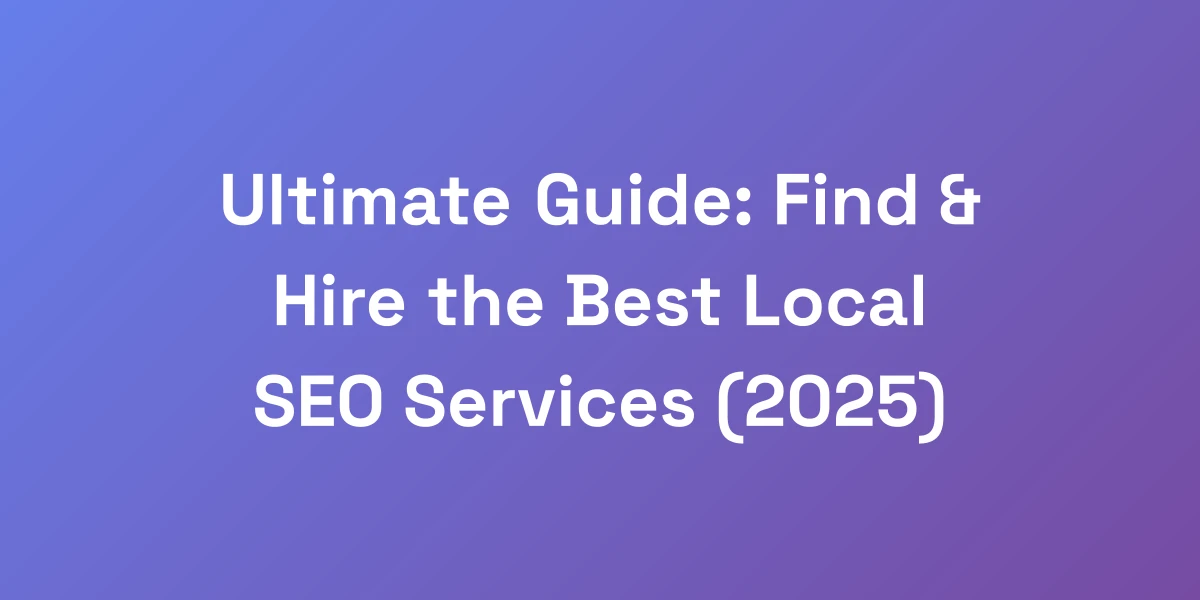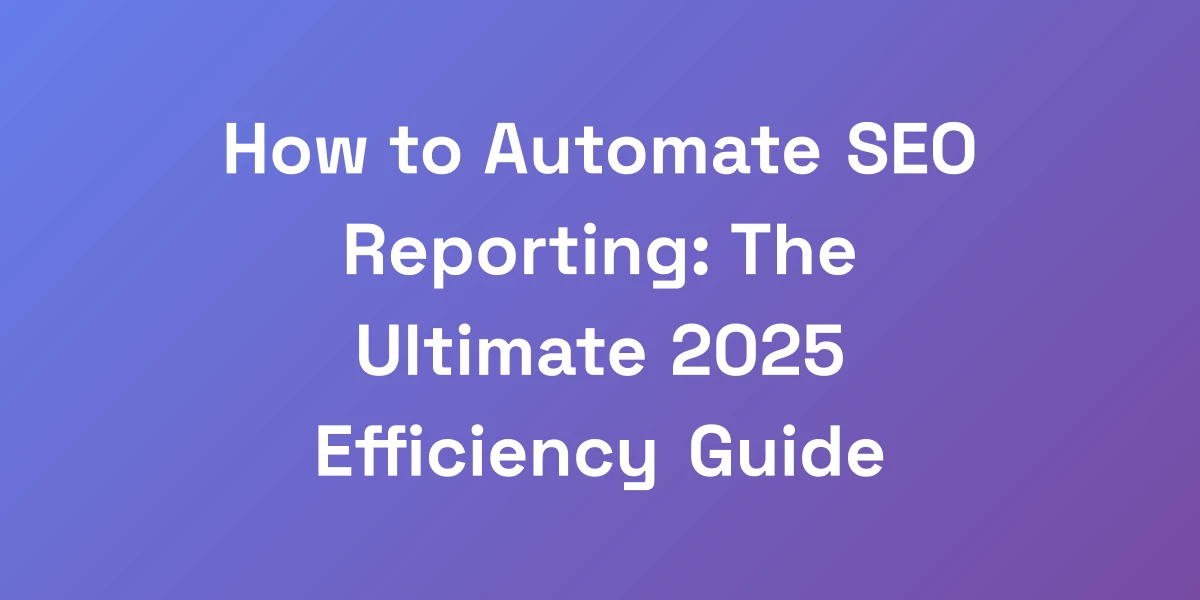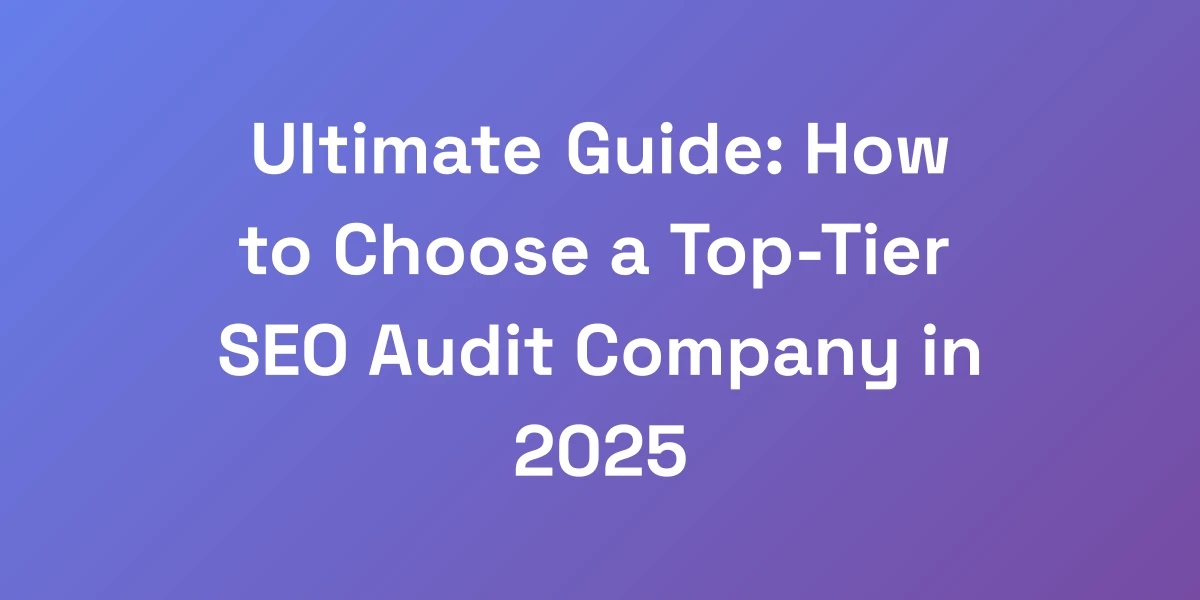
How to Find the Best SEO Company Near You: A No-BS Guide (2025)
Feb 28, 2025 | By zishansami102@gmail.com
Finding the right SEO company isn’t just about checking boxes; it’s about ensuring that every step they take directly impacts your bottom line.
We’ve all been there—searching for that elusive “best SEO company near me” who promises the moon but delivers mediocrity. The digital landscape is cluttered with agencies that flaunt impressive client lists and fancy offices, yet fail to drive real revenue. So, why is it so hard to find a local SEO partner who cuts through the noise and actually gets results?
In this no-BS guide, we’re pulling back the curtain on what truly matters when selecting an SEO company near you. Forget the fluff and vanity metrics. It’s time to focus on what drives growth, conversions, and sustainable success. Ready to dive deep into the reality of local SEO? Let’s get started.
The Truth About Local SEO Companies Most Won’t Tell You
Let me cut through the BS right now—90% of local SEO companies are selling you overpriced packages filled with useless metrics and vanity numbers. I’ve spent millions testing what actually works in SEO, and here’s the raw truth: you need a company that focuses on revenue-generating rankings, not just traffic. The difference between a great local SEO company and a mediocre one isn’t their fancy office or their client list—it’s their ability to directly tie their work to your bottom line. Let’s break down what actually matters when choosing an SEO partner that won’t waste your money.
Why Most Local SEO Companies Fail Their Clients
Most local SEO companies fail due to a lack of focus on essential elements that drive real results. They might promise high traffic numbers, but without conversion-focused strategies, those visitors won’t turn into customers.
Here are the primary reasons they fall short:
- Lack of Customization: Using a one-size-fits-all approach doesn’t cater to your unique business needs.
- Overemphasis on keyword rankings: Focusing solely on keyword rankings rather than user intent and conversion.
- Poor Communication: Not maintaining transparent and consistent communication with clients.
- Outdated Techniques: Relying on obsolete SEO practices that no longer work with current algorithms.
For example, a local bakery might see increased traffic but no rise in orders because the SEO strategy ignores user intent—people searching might not be ready to buy yet.
The Real Metrics That Show SEO Success
Instead of chasing vanity metrics like total website traffic, focus on these revenue-focused KPIs:
- Conversion Rates: The percentage of visitors who take a desired action, like making a purchase or booking a service.
- Customer Acquisition Cost (CAC): How much it costs to acquire a new customer through SEO efforts.
- Lifetime Value (LTV): The total revenue a business can expect from a single customer account.
- Return on Investment (ROI): The profitability relative to the cost of SEO services.
For instance, a gym in Dallas saw a 270% increase in revenue not because of increased traffic, but because their SEO strategy targeted high-intent keywords leading to more memberships.
Red Flags That Scream “Stay Away”
Not all that glitters is gold. Here are warning signs to watch out for when vetting local SEO companies:
- Guaranteed Rankings: SEO is complex and unpredictable; no one can guarantee #1 rankings consistently.
- Black-Hat Techniques: Practices like keyword stuffing or buying backlinks can lead to penalties.
- Lack of Transparency: Reluctance to share strategies, reports, or discuss their methods.
- No Proven Track Record: Lack of case studies or client testimonials to validate their claims.
Imagine hiring an agency that promises overnight success through dubious methods. Not only could your rankings drop, but your online reputation could suffer as well.
What Top-Performing SEO Companies Actually Deliver
Top SEO companies go beyond just improving rankings. They implement strategies that drive measurable business growth. Here’s what they focus on:
- Comprehensive SEO Automation Audits: Identifying and fixing technical issues that hinder search performance.
- Content Strategy: Creating high-quality, relevant content that engages and converts.
- Link Building: Developing a robust backlink profile with authoritative and relevant links.
- Local Optimization: Enhancing local presence through Google My Business and local citations.
- Conversion Rate Optimization: Refining website elements to improve user experience and conversion rates.
For example, a family law attorney increased their leads by optimizing their Google My Business listings and creating targeted content that addressed specific client needs.
The Cost vs. Value Equation in Local SEO
Cost shouldn’t be the sole factor in choosing an SEO company. Instead, evaluate the value they provide. Here’s how to balance cost with value:
- Service Quality: High-quality services might cost more but deliver better ROI.
- Customized Solutions: Tailored strategies that address your specific business goals.
- Transparent Reporting: Clear and detailed reports that show exactly what they’re achieving.
- Long-Term Strategy: Sustainable practices that ensure continued growth rather than short-term gains.
Think of it like hiring a personal trainer. The cheapest option might not provide the best results, while investing in a skilled trainer can lead to significant improvements in your fitness, just as a quality SEO company can drive substantial business growth.
Critical Questions to Ask Before Hiring Any SEO Company
Stop asking surface-level questions about “years in business” or “number of clients.” Those metrics mean nothing if they can’t drive results. Instead, demand specific answers about their process, deliverables, and most importantly—their failures. Yes, you read that right. A legitimate SEO company should be transparent about what hasn’t worked and what they learned from it. The best predictor of future success isn’t their highlight reel—it’s how they handle and learn from setbacks. Here are the exact questions that separate the pros from the pretenders.
Performance Guarantee and Risk Sharing
Ask about their performance guarantees and how they share the risks. Are they willing to align their success with yours?
- “What guarantees can you provide for our SEO results?” A reputable company won’t promise specific rankings but will outline strategies to achieve your goals.
- “How do you handle underperformance?” Understanding their approach to profit share SEO can reveal their commitment to your success.
Specific Timeline and Milestone Commitments
Clarity on timelines and milestones ensures you’re both on the same page.
- “What is your typical timeline for achieving measurable results?” This helps set realistic expectations.
- “Can you outline the key milestones in your SEO process?” Knowing the steps they plan to take provides insight into their strategy.
Their Worst Case Study (And What They Learned)
Understanding how they handle failures is just as important as celebrating successes.
- “Can you share a case where your SEO strategy didn’t work as planned?” This shows their willingness to be transparent.
- “What did you learn from that experience?” Learning from setbacks is crucial for long-term success.
Technical SEO Audit Process
Delving into their technical SEO capabilities ensures they can handle the foundational aspects of your website.
- “How do you conduct a technical SEO audit?” A detailed response indicates their thoroughness.
- “What tools do you use for technical SEO analysis?” Knowing their toolkit can reveal their level of expertise.
Content Development and Link Building Strategy
Content and backlinks are pillars of SEO. Understanding their approach here is critical.
- “What is your content creation process?” Quality content drives engagement and rankings.
- “How do you approach link building?” Ethical and effective link building strategies are essential for long-term success.
Monthly Reporting and Communication Protocol
Regular updates and clear communication keep you informed and aligned with their efforts.
- “How often will we communicate and receive reports?” Consistent communication ensures transparency.
- “What key metrics will you report on?” Knowing what they’ll track helps you gauge performance through automated SEO reporting.
The Hidden Metrics That Actually Matter in Local SEO
Forget about generic rankings and traffic numbers. What moves the needle in local SEO is conversion-focused optimization. I’m talking about metrics that directly impact your revenue—not vanity metrics that look good in a PowerPoint presentation. The best SEO companies near you should be obsessed with customer acquisition costs, lifetime value, and return on ad spend. Here’s what you need to track to ensure your SEO investment is actually growing your business.
Beyond Rankings: Revenue-Focused KPIs
Rankings are just the beginning. Focus on KPIs that tie directly to revenue.
- Conversion Rates: How many visitors are converting into customers?
- Customer Acquisition Cost (CAC): How much are you spending to acquire each customer through SEO?
- Lifetime Value (LTV): What is the total revenue expected from a customer over their relationship with your business?
For example, a local real estate agent didn’t just aim for higher search rankings—they focused on increasing qualified leads that convert into property sales, directly boosting their revenue.
Local Pack Performance Indicators
The Local Pack on Google is a prime spot for visibility. Tracking its performance is crucial.
- Click-Through Rate (CTR): How many users are clicking on your Local Pack listing?
- Local Pack Rankings: Are you consistently appearing in the top three results?
- Engagement Metrics: How are users interacting with your Local Pack listing?
A restaurant in New York City saw a 270% increase in revenue by optimizing their Local Pack presence, which led to more clicks and foot traffic.
Conversion Rate Optimization Metrics
Optimizing for conversions ensures that the traffic you receive is translating into business growth.
- Landing Page Conversion Rates: Are your landing pages designed to convert visitors?
- Form Submission Rates: How many users are completing contact or inquiry forms?
- Call-to-Action (CTA) Effectiveness: Are your CTAs compelling enough to drive action?
For instance, a gym in Dallas implemented conversion rate optimization strategies that increased membership sign-ups by refining their landing pages and improving CTAs.
Customer Acquisition Cost Analysis
Understanding how much it costs to acquire a customer through SEO helps in assessing the effectiveness of your strategy.
- Calculate CAC: Total SEO spend divided by the number of customers acquired.
- Benchmark Against Industry Standards: Compare your CAC to industry averages.
- Identify Cost-Effective Channels: Determine which SEO activities yield the best ROI.
For example, financial services businesses might have a higher CAC, but understanding this helps in allocating resources efficiently to maximize returns.
Competition Benchmark Tracking
Keeping an eye on your competitors ensures you stay ahead in the local SEO game.
- Competitor Rankings: Where do you stand compared to your local competitors?
- Content Strategies: What kind of content are your competitors producing?
- Backlink Profiles: How strong are your competitors’ backlinks compared to yours?
Tracking these metrics allows you to adjust your strategies proactively to outperform your competition.
ROI Measurement Framework
Having a clear framework to measure ROI ensures you’re getting value from your SEO investment.
- Calculate ROI: (Revenue Generated from SEO – SEO Costs) / SEO Costs * 100
- Track Long-Term Benefits: SEO is a long-term strategy; evaluate its impact over time.
- Adjust Strategies Based on ROI: Continuously refine your SEO strategies based on what’s working.
For example, after six months, a family law attorney evaluated their ROI and found that optimizing local listings resulted in significant lead generation without additional advertising costs.
How to Structure Your SEO Partnership for Maximum Results
The difference between a 6-figure and 7-figure SEO campaign isn’t just strategy—it’s how you structure the partnership. Most business owners get this completely wrong. They treat SEO like a vendor relationship when it should be a strategic alliance with skin in the game. I’ll show you exactly how to structure your SEO partnership to ensure both parties are aligned for maximum results, including performance-based compensation models that actually work.
Performance-Based Compensation Models
Aligning compensation with performance ensures that the SEO company is as invested in your success as you are.
- Revenue Sharing: Share a percentage of the revenue generated from SEO efforts.
- Milestone Bonuses: Bonuses for achieving specific targets like increased rankings or lead generation.
- Retainer Plus Performance Bonuses: A base retainer fee with additional bonuses based on performance metrics.
For example, a national lead generation company partnered with an SEO agency on a revenue-sharing model, ensuring both parties were motivated to maximize lead quality and conversions.
Clear Deliverables and Milestones
Defining clear deliverables and milestones keeps the project on track and ensures accountability.
- Monthly Reports: Regular updates on performance metrics and progress.
- Quarterly Reviews: In-depth analysis and strategy adjustments based on results.
- Defined Goals: Specific, measurable goals to be achieved within set timeframes.
Set up a timeline where each milestone is clearly defined, such as completing a technical SEO audit within the first two weeks or launching a content strategy by month three.
Communication and Reporting Protocols
Establishing robust communication channels ensures that both parties are always aligned.
- Regular Meetings: Weekly or bi-weekly check-ins to discuss progress and challenges.
- Detailed Reports: Comprehensive monthly reports that cover key metrics and insights.
- Transparent Communication: Open channels for questions, feedback, and strategy discussions.
Imagine having a monthly meeting where you not only review SEO performance but also brainstorm new content ideas and discuss upcoming local events that can be leveraged for SEO benefits.
Crisis Management Procedures
Even the best strategies can hit roadblocks. Having a plan in place for crisis management is crucial.
- Swift Response: Quick actions to address sudden ranking drops or penalties.
- Root Cause Analysis: Identifying the underlying issues causing the crisis.
- Recovery Plan: Steps to recover from setbacks and prevent future occurrences.
For instance, if there’s an unexpected drop in rankings due to a Google algorithm update, a well-structured SEO company will quickly analyze the impact and adjust strategies accordingly.
Scale and Growth Planning
Planning for future growth ensures that your SEO strategy evolves with your business.
- Scalable Strategies: SEO tactics that can grow with your business needs.
- Long-Term Vision: Aligning SEO efforts with your business expansion plans.
- Resource Allocation: Efficiently allocating resources to areas that drive the most growth.
A landscaping business expanding to multiple cities can rely on their SEO partner to adapt strategies for each new location, ensuring consistent growth across all markets.
Exit Criteria and Contract Terms
Having clear exit criteria and contract terms protects both parties and outlines expectations.
- Defined Exit Terms: Conditions under which either party can terminate the partnership.
- Performance Benchmarks: Clear benchmarks that need to be met before contract renewal.
- Non-Compete Clauses: Protecting both parties’ interests in case of contract termination.
For example, if an SEO company consistently fails to meet agreed-upon performance metrics, having predefined exit criteria allows you to terminate the contract without ongoing obligations.
Implementation Timeline: Your First 90 Days with an SEO Company
The first 90 days with your new SEO company will make or break your success. Most companies waste this crucial period with endless “research” and “planning.” Instead, you need a rapid implementation framework that starts driving results immediately. Here’s the exact timeline I use with my clients to ensure we’re making progress from day one, including weekly milestones and deliverables that keep everyone accountable.
Week 1-2: Technical Audit and Quick Wins
Start with a comprehensive technical SEO audit to identify and fix immediate issues.
- Site Speed Optimization: Improve loading times to enhance user experience.
- Mobile Responsiveness: Ensure your site performs well on all devices.
- Fix Broken Links: Repair or remove broken links that hinder SEO performance.
For instance, a local restaurant improved their site speed by 30%, resulting in a better user experience and higher search rankings.
Week 3-4: Content Strategy Implementation
Develop and begin executing a content strategy focused on local relevance and user intent.
- Keyword Research: Identify high-intent local keywords to target.
- Content Creation: Develop blog posts, landing pages, and other content that addresses local needs.
- On-Page Optimization: Optimize existing content for better search performance.
A law firm, for example, created targeted content about family law issues specific to their local area, attracting more qualified leads.
Week 5-6: Link Building and Authority Building
Focus on building high-quality backlinks and establishing authority in your local market.
- Local Directories: Submit your business to reputable local directories.
- Guest Blogging: Contribute to local blogs and publications to earn backlinks.
- Partnerships: Collaborate with local businesses and influencers for mutual link-building opportunities.
For instance, a gym in Dallas built relationships with local health bloggers, securing backlinks that boosted their authority and search rankings.
Week 7-8: Local SEO Optimization
Enhance your local SEO to dominate the local search results.
- Google My Business Optimization: Fully optimize your GMB listing with accurate information, photos, and posts.
- Citation Building: Ensure consistent NAP (Name, Address, Phone) information across all platforms.
- Review Generation: Implement strategies to encourage positive customer reviews.
A family law attorney saw a significant increase in local visibility and lead generation after optimizing their Google My Business listing and actively managing reviews.
Week 9-10: Conversion Rate Optimization
Improve your website’s ability to convert visitors into customers.
- Landing Page Enhancements: Refine landing pages with clear CTAs and persuasive content.
- User Experience Improvements: Simplify navigation and reduce friction points.
- A/B Testing: Test different elements to determine what drives the highest conversions.
For example, a local eCommerce store optimized their checkout process, resulting in a 20% increase in completed purchases.
Week 11-12: Performance Analysis and Strategy Adjustment
Analyze the results from the first three months and adjust your strategy accordingly.
- Performance Review: Evaluate what worked and what didn’t based on key metrics.
- Strategy Refinement: Adjust strategies to focus on high-performing areas.
- Set New Goals: Establish new targets based on the initial results.
A local landscaping business adjusted their content strategy based on performance data, focusing more on high-conversion service pages that attracted qualified leads.
Conclusion
Finding the best SEO company near you doesn’t have to be a daunting task. By cutting through the noise and focusing on revenue-driven strategies, clear communication, and measurable results, you can partner with an agency that genuinely contributes to your business growth. Remember, it’s not about flashy metrics or expensive packages—it’s about finding a strategic ally committed to your success.
Ready to take your local SEO to the next level? Start asking the right questions, focus on the metrics that matter, and choose a partner who aligns their goals with yours. Don’t settle for mediocrity when your business deserves excellence.
Have experiences with local SEO that you’d like to share? Drop a comment below and let’s discuss how you can maximize your SEO investments for real, tangible results.
